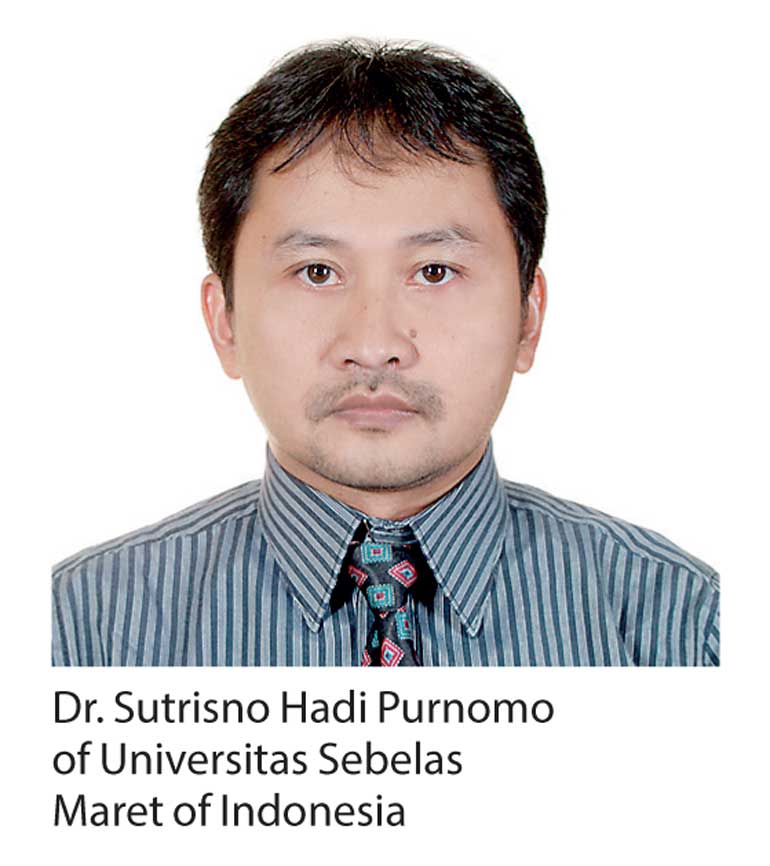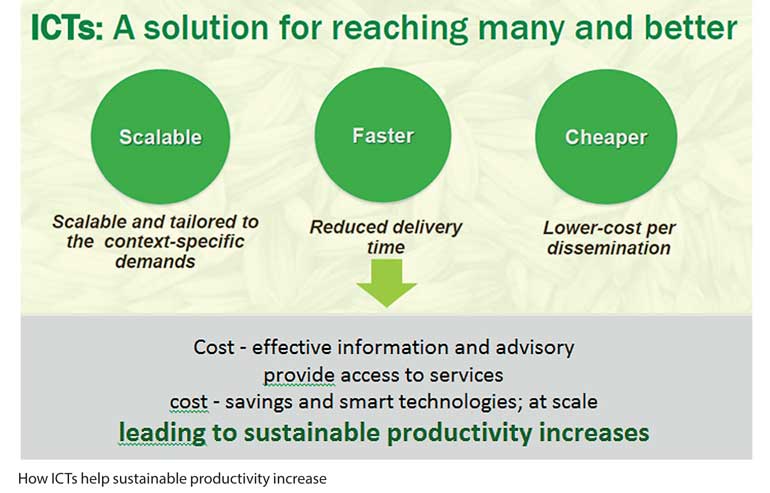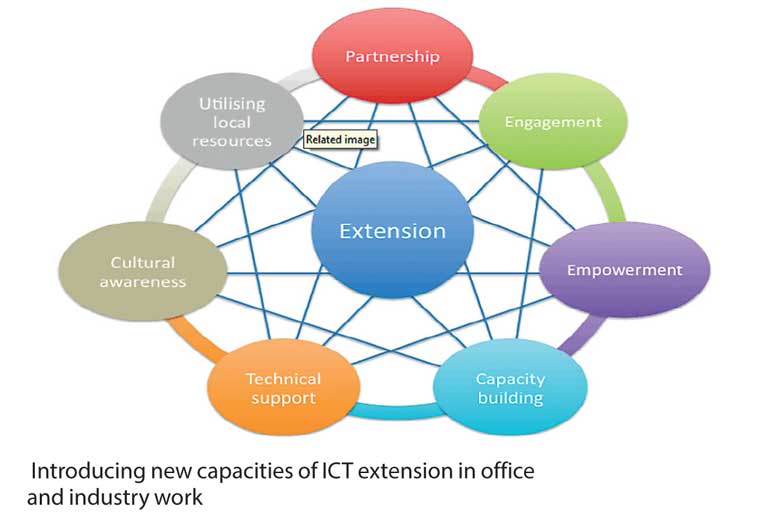Thursday Feb 26, 2026
Thursday Feb 26, 2026
Wednesday, 10 January 2018 00:00 - - {{hitsCtrl.values.hits}}


 By Harsha
By Harsha
Udayakantha Peiris
Correct implementation of Information Communication Technology (ICT) in institutional activities can help create good governance in departmental, inter-departmental, institutional, inter-institutional and industry work areas to maximise productivity with improved efficiency. The correct utilisation of ICT initiatives therefore, can help considerably reduce employee woes and pave way to enhance networking among work mates towards sustainable industrial peace in all levels of office and industry work.
“Technologies that provide access to information through telecommunication are basically known as ICT. Recent developments in ICT have introduced a plethora of opportunities in every conceivable area. The fusion of computing and communications, especially through the internet has reduced the world indeed into a global village creating new actors and new environments,” says Dr. Sutrisno Hadi Purnomo of Universitas Sebelas Maret of Indonesia.
In formal and non-formal learning contexts that use an information network such as the internet or intranet, for course delivery, interaction and evaluation, ICT plays a pivotal role in team building in office and industry work. Its regulation in office work encourages workers to minimise paper work and the waste of time by allowing exchanges of services and sharing of work through e-communication for in-timely accomplishment of targets.
A CEO can call a Skype meeting of HODs working in different departments in scattered locations or regions of the same institution and convene them through video conferencing at a given time, so that it can dramatically reduce costs such as for transport, fuel and driver usage, extra miscellaneous financial allocations and etc; to call staffs to appear physically at the Head Quarters. Due to credible data management systems by a number of competitive telecommunication service providers at present, such initiatives have been identified as undisrupted facilitations of extended e-communication.
The role of ICT in office work can also play a major role towards capacity building and empowerment of work forces, enhanced service access in both in-house and output levels, enhancing risk management and early warning or prevention systems, promotion of environmentally sustainable office and industrial work practices as well as enhancing regulatory and policy making processes. Thereby, ICTs can bridge the gap of dissemination of information between top, intermediate as well as middle management level staffs and employees at bottom levels by acting as a two way communication catalyst in delivering timely management decisions transparently from top to bottom at the same time, helping communicate effectively to address and resolve employee woes from a bottom to top approach.
Community radio in agriculture rectification in rural communities is a broadly realised example in this regard that utilises airwaves, a national property, in the right way to redress matters in rural farmer communities. The recent implementation of ‘Pension Online Magazine’ and ‘Pensions Online Radio’ by the Department of Pensions of Sri Lanka also stands a shining example in creating network clusters via cyber space not only to address employee matters but also to cater for an enhanced relationship between the internal/external customers and the service provider.
Through implementing regulatory policies, frame works and ways, ICTs can monitor and evaluate the progress of departments and institutions. The online exchanges during office or industrial working hours lure employees to continue stay in their working clusters or slots thereby minimising the so much worried ‘employee missing times’ during work hours. ICTs also provide timely and real-time actionable information in office work on institutional implementations, new markets and services, whilst providing credible instructions on risk mitigation techniques.
Thus, they help deliver more efficient and reliable data to comply with international traceability standards in all areas of work under Sustainable Development Goals (SDGs) or, the Global Goals in other words. SDGs are a universal call by the United Nations (UN) to action to end poverty, protect the planet and ensure that all people enjoy peace and prosperity. According to the ITU of the Food and Agriculture Organization (FAO), ICTc increase access to financial services to rural communities, help secure savings, find affordable insurance and tools to better manage risks. ICTs also facilitate market access for inputs as well as product marketing and trade in a variety of ways paving way towards the best practices of institutional and industrial procedures and implementations for success.
In order to prevail a sustainable ICT practicing generation in both office and industry work, the role of the ICT extension agent cannot be disregarded in any way. In an office environment, the role of the ICT extension agent can be that of a teacher, facilitator, organiser, arbitrator, educator, broker, administrator, advocate, leader, consultant, enabler, catalyst, communicator, intermediary, activist, friend, motivator, listener, provider and a stimulator.
If an employee still seeks support of a traditional manual to refer a particular contact detail in office work, even though the latest ICT tools like the desktop with internet have been provided at hand, it is proposed that such staff environs badly need the timely support of an ICT extension agent. Here, the ICT extension agent should re-introduce the already available ICT devices and tools such as digital reference indexes to work mates for timely acquisition, sharing and delivery of information.
ICT extension agents, in such instances also have the responsibility to efficiently assist to carry out management policy decisions and national requirements through networking via ICT mechanisms such as national window portals that connect a number of government and non government agencies, institutions, bodies and stakeholders together in sharing important information and especially a variety of e-commerce procedures. And more particularly, in many cases, the fact that the ICT extension agent should exist as a full time team player within the same work environment is more beneficial to provide necessary assistance to employees as a sustainable, in-house and on service training.
Through ICT implementations, employees’ behaviour and presence in office or industry work can be constantly and strategically monitored. The online arrival and departure finger print systems, online leave request systems and the online systems of granting approval or rejection of information can be identified as other primary strategic implementations of the ICT in office and industry work.
Such procedures allow Senior Executives to be present minded on the available HR capacity during a particular period so that alternative strategies can be utilised easily and necessarily to boost efficiency during non-availability of sufficient staffs or employees to successfully accomplish targets in time. Such procedures by default encourage an employee to propose a subordinate beforehand to fulfil duties during absence.
Facebook of the new media or social media is another strategic ICT implementation that can be effectively utilised in office work. Several developed countries have encouraged employees to use Facebook during office work and out of the office to perform office work. The use of Facebook in office work can ease employee woes and at the same time platforms to hold official discussions, remind and encourage peer groups of requirements pertaining to timely accomplishment of targets at work. Considering the effectiveness of these cyber implementations, at present, several developed countries have also identified and adapted it as an effective HR management tool in office work.
“In my office, I have allowed and encouraged employees to stay inter-connected through Facebook during office hours. It has reduced the number of employees bother to directly report me to make complaints. Now, they can discuss themselves or chat on Facebook so several minor matters that can be effectively addressed with no intervention of the seniors can be resolved. Since the immediate senior officials are also connected the same way to network through Facebook, they monitor employee behaviour online and even share information on the platform to expedite and encourage fulfilling targets with no hassle at all.
Extension of instructions through chat devices such as the Messenger on Facebook have helped to multiplying sharing of information, issuing of instructions, problem solving and have paved way towards maintaining a calm and quiet office environment as the exchange of information through ICT mechanisms have largely contributed to sustain discipline in office and industry work. On the other hand, it helps build peace of mind at work and also saves human energy at work.
We also have a scheme that monthly monitors the share of contribution of personal Facebook by each employee for office work, maintenance of his or her personal account in a socially accepted manner and we reward the best three employees who use the face book in a proficient manner every month. We even display their names and profile pictures at a prominent place in office as the ‘Best Three Facebook Users of the Month’,” one CEO of a private company said.
Recently, a local state bank through an e-mail had urged all its branch managers to encourage stakeholders and customers to increase using the online tools such as the bank’s official website and the official Facebook to obtain services online on a 24/7 basis.
According to Dr. Sutrisno Hadi Purnomo, cyber extension of the ICT is another effective tool to be utilised in realising timely office and industry functions. “It is the extension of the development of office and industry related work with the help of Information and Communication Technologies over cyber space. This is an imaginary space behind networked computers through telecom means. This kind of a strong information sharing network is made possible through the power of networks, computer communications and interactive multimedia. On the other hand, this means, extension over cyber space of all the internet tools for developing and accessing office information. These tools include; email, expert systems providing knowledge information, internet browsing for the extension of information, video conferencing, call centres and satellite communication networks as well as news and discussion groups,” Dr. Sutrisno says.
In order to realise the fruitful utilisation of cyber extension to improve productivity in office and industry work, extension activities as a system need to be supported by other sub-systems so that they can function properly. These sub-systems can include; a policy sub-system, monitoring sub-system, evaluation, message interpreter sub-system, planning and budgetary sub-system, personnel sub-system, facilities and infrastructure or logistic sub-system, research and development sub-system, educational and training sub-system, information and publications sub-system as well as an extension operator sub-system.
In such activations, Knowledge Management (KM) in cyber extension encompasses processes and practices concerned with creation, acquisition, sharing as well as the use of knowledge, skills and expertise which follow a circular flow and a non-stop process that continuously updates itself as Knowledge Management deals with the process of capturing, sharing and using of knowledge and techniques.
“At present, cyber extension, to a greater extent is facilitating the transformation of work in office and industry to improve the interactivity of users by communicating in both directions. It puts the material more broadly and deeply so that it will improve the quality of information extension workers to accelerate the flow of information technology to end-users such as stakeholders and customers. Therefore, the continuous availability of cyber extension is a wealth of almost unlimited information, instant international reach, individuality as well as cost, time and energy savings. It is also a special type of innovation in terms of innovative learning because it has a wide variety of applications,” says Dr. Sutrisno.
In a positive but an invasive approach, ICT today, is rapidly conquering almost every mean of office and industry work process almost in every nook and corner of the world. As the development progresses, many traditional office and industry procedures therefore, should be accurately diverted towards the implementations of ICT in order to productively sustain in competitive work environments. Adherence to tradition and traditional procedures without changing towards innovative forward steps of technologies mean nothing but further loss of resources and wealth.
(The writer is a participant of the recent e-learning initiative on ICT based services supported by the Asian Productivity Organization in Japan and conducted by the National Productivity Secretariat of the Ministry of Public Administration, at SLIDA, Colombo).